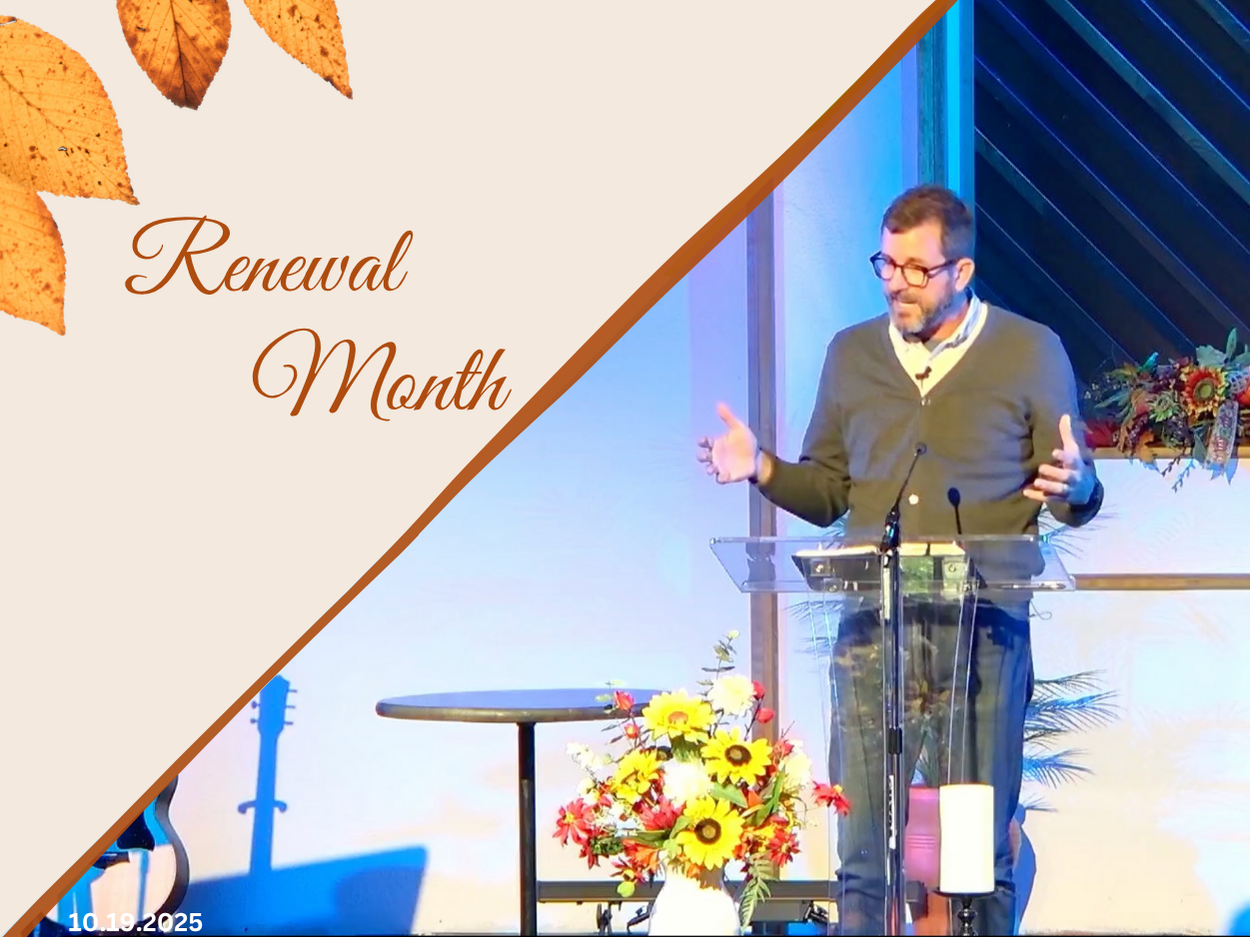October 19, 2025
Renewal Month
Week 3: The Jerusalem Problem
Guest Speaker Adam Stoddard | In Renewal Month 2025
The Jerusalem Problem
Meanwhile, the believers who had been scattered during the persecution after Stephen’s death traveled as far as Phoenicia, Cyprus, and Antioch of Syria. They preached the word of God, but only to Jews. However, some of the believers who went to Antioch from Cyprus and Cyrene began preaching to the Gentiles about the Lord Jesus. The power of the Lord was with them, and a large number of these Gentiles believed and turned to the Lord.
When the church at Jerusalem heard what had happened, they sent Barnabas to Antioch. 23When he arrived and saw this evidence of God’s blessing, he was filled with joy, and he encouraged the believers to stay true to the Lord. Barnabas was a good man, full of the Holy Spirit and strong in faith. And many people were brought to the Lord.
Then Barnabas went on to Tarsus to look for Saul. When he found him, he brought him back to Antioch. Both of them stayed there with the church for a full year, teaching large crowds of people. (It was at Antioch that the believers were first called Christians.)
Acts 11: 19-26 NLT
While Paul and Barnabas were at Antioch of Syria, some men from Judea arrived and began to teach the believers: “Unless you are circumcised as required by the law of Moses, you cannot be saved.” Paul and Barnabas disagreed with them, arguing vehemently. Finally, the church decided to send Paul and Barnabas to Jerusalem, accompanied by some local believers, to talk to the apostles and elders about this question. The church sent the delegates to Jerusalem, and they stopped along the way in Phoenicia and Samaria to visit the believers. They told them—much to everyone’s joy—that the Gentiles, too, were being converted.
When they arrived in Jerusalem, Barnabas and Paul were welcomed by the whole church, including the apostles and elders. They reported everything God had done through them. But then some of the believers who belonged to the sect of the Pharisees stood up and insisted, “The Gentile converts must be circumcised and required to follow the law of Moses.”
So the apostles and elders met together to resolve this issue. At the meeting, after a long discussion, Peter stood and addressed them as follows: “Brothers, you all know that God chose me from among you some time ago to preach to the Gentiles so that they could hear the Good News and believe. God knows people’s hearts, and he confirmed that he accepts Gentiles by giving them the Holy Spirit, just as he did to us. He made no distinction between us and them, for he cleansed their hearts through faith. So why are you now challenging God by burdening the Gentile believers with a yoke that neither we nor our ancestors were able to bear? We believe that we are all saved the same way, by the undeserved grace of the Lord Jesus.”
Everyone listened quietly as Barnabas and Paul told about the miraculous signs and wonders God had done through them among the Gentiles.
Acts 15: 1-12 NLT
The future and framework of the church will always defy our assumptions and expectations,
as long as the Holy Spirit is involved.
The Jerusalem Problem:
The Gospel is for certain people, in certain places.
For us, not for them.
A failure of imagination.
Church Planting Strategies:
Modern Strategy: Plant a church, make disciples, engage the city.
Biblical Strategy: Engage the city, make disciples, plant a church.
New Skills for Missional Living (From Hugh Halter’s “Tangible Kingdom”)
LEAVING: We replace some of our church-centered activities with time spent building real relationships, embodying the Gospel in our daily lives.
LIVING AMONG: We immerse ourselves in the healthy rhythms of our neighborhoods with whimsical holiness. (Being like Jesus with those Jesus would’ve been with.)
LISTENING TO: We watch for and respond to people’s needs with Gospel hope and help.
LOVING WITH: We look for ways to announce the goodness and mercy of Jesus through our words and our ways of living.
INVITING IN: As we love well, listen closely, and live faithfully—we earn the opportunity to invite others into relationship with Jesus, into the church.

